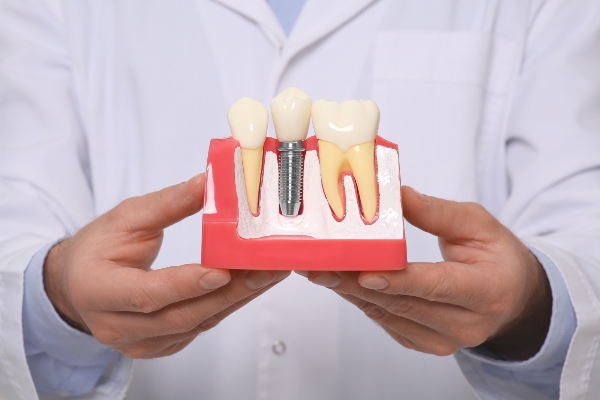When Is a Dental Crown Recommended?

A dental crown is a restoration option designed to cover a weak or damaged tooth, restoring its function and appearance. The crown protects the tooth from further damage and prevents the need for extraction. Different types of dental crowns are available, each custom-made to fit over the tooth and blend in with the rest of the teeth. This article covers instances when the dentist might recommend getting a dental crown.
When are dental crowns needed?
Different conditions that might require placing a dental crown over the tooth include large decay or dental fillings, root canal treatments, a cracked tooth, broken tooth cusps, enamel deterioration, and aesthetic improvement.
Large decay or dental fillings
A dental crown is required to protect the tooth when a cavity or decay has damaged a significant portion of the tooth. The existing tooth structure will not be strong enough to handle dental functions like chewing or biting and may even break completely. Also, if a tooth already has a large filling, the patient will need a dental crown to support it if there are signs of cracking or stress on the filling.
Root canal treatment
A root canal treatment removes infected pulp material in the tooth. However, the treatment leaves the pulp chamber empty, making the tooth weaker and prone to breakage. Therefore, the dentist will recommend covering the treated tooth with a dental crown to prevent damage.
Cracked tooth
When the tooth has fracture lines or cracks, it may cause significant pain or discomfort when chewing. The pressure from chewing affects the fracture lines; patients may feel like their teeth will break apart. Crown placement keeps the tooth structure together, absorbing chewing forces and spreading it evenly. The result is less pain. Sometimes, the dentist may place a temporary crown to alleviate the discomfort and ensure a root canal procedure is unnecessary before placing the permanent crown.
Broken teeth cusps
Physical injury to the teeth can damage the tooth cusps. The cusps handle the chewing functions of the teeth, which means prompt repair is necessary to prevent additional damage. In some cases, the breakage may extend to the gum line, and the dentist may need to perform crown lengthening. The bone and gums around the broken part of the tooth will be trimmed so that the tooth structure can take the dental crown.
Enamel deterioration
Habits like teeth grinding can cause enamel deterioration. The acid from gastrointestinal acid reflux, acidic diets, or bulimia can also contribute to enamel erosion. The deterioration of the enamel predisposes other layers of the tooth to damage and infection. The dentist will recommend getting a dental crown to restore the tooth’s shape and form. It will also stop teeth sensitivity caused by enamel erosion.
Aesthetic improvement
If the teeth are crooked, or have stains or gaps, the teeth will look less attractive. The dentist may recommend placing dental crowns to make the smile look aesthetically appealing. For a missing tooth, the dental crown is connected to the dental implant or makes up part of the dental bridge to serve as a tooth replacement option.
The process of getting a dental crown
Being well-informed may help reduce anxiety and ensure proper preparation for getting a dental crown. The dentist will provide a local anesthetic to keep the patient as comfortable as possible. The tooth may initially need a filling to repair enough of the tooth for the crown to attach. The dentist will then shape the tooth so the crown can fit over it. Finally, if done in our office, you will receive a digital scan (no goo, just a picture), and a crown can be made within the hour. Next, the dentist will check the fit and finally, use dental cement to hold the crown in place permanently.
At Rivers Family Dentistry, this can all be done in one appointment without having to deal with temporaries or a return visit.
The bottom line
If you have a damaged tooth, a crown (or a cap) may protect it and restore its shape and size so that it can continue to function normally for many more years. Dental crowns protect the tooth, make it last longer, and improve the aesthetics. They do an excellent job restoring the tooth to its natural size and form, making a severely damaged tooth seem like a normal tooth again. If you think getting a dental crown would be an effective option for your condition, contact our dental office to schedule an examination and review your options.
Request an appointment here: https://www.riversdentistry.com or call Rivers Family Dentistry at (979) 710-2216 for an appointment in our Bryan office.
Check out what others are saying about our dental services on Yelp: Dental Crowns in Bryan, TX.
Related Posts
Are you considering getting dental crowns? Before moving forward, you need to ask your dentist some questions. This will help you understand the procedure and what to expect when it is over. Then you will have the information you need to make an informed decision about dental crowns.Getting crowns is a huge decision. Patients should…
While the cost of dental crowns is usually covered by insurance, getting a crown can still be an expensive and time-consuming process. Once the crown is in place, it can be tempting to forget about it and continue your normal habits, but not being mindful of your tooth restoration could lead to you having to…
A dental crown is a cap that fits over a person’s tooth. A crown is commonly used to restore decayed, missing, or cracked tooth structure. Whether a dental crown is ideal for you will depend on the condition of your teeth and the issue you are trying to fix. Read on to find out more…
If you've been told you need dental crowns or want to know more about them, here's an explanation of what they are and how they're used to protect your tooth from damage caused by decay, injury, or other factors. The following article provides some information about the materials used to make crowns and their benefits…


